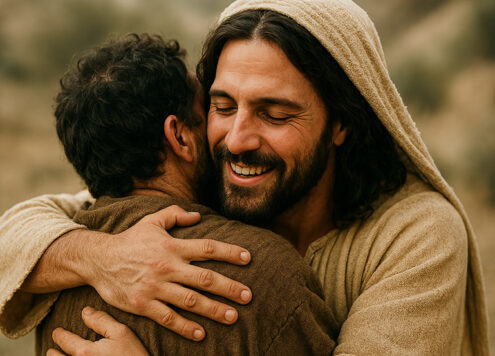There was a man who used to gamble and drink a lot before he converted to Christ. His fellow workers were fond of teasing him: “Surely a man like you doesn’t believe in miracles and all that bible stuff. How could you believe that Jesus turned water into wine?”
The man’s reply was, “Whether He turned water into wine or not I do not know, but in my home I have seen Him turn my love of whiskey and beer into love of family.” His accusers had nothing more to say. This changed-man became a light to others, especially his family, through the change that took place in his life.
The strongest argument for the Christian faith is to be found, not in words but in example, by showing what your faith can do to your life. No one can argue against the power of a changed life, a life that is engaged in helping others and, especially, the most vulnerable among us. Isn’t it interesting that Jesus gave us a new commandment, a commandment that overrides and includes all the others: to love one another the way he has loved us? Love is obviously the answer. But this love Jesus talks about is no pie in the sky feeling or mood or self-congratulatory lip-service. It is the real thing for it means reaching out to the vulnerable: the sick, the lonely, the hungry, the stranger, the homeless or the jobless. By doing these “good things” for one another, Jesus assures us (in Matthew 25) that we will gain an entry into his kingdom.
In the Scripture, the Lord asks us to let our light shine through the things we do for others (Matthew 5 : 6). This is the kind of light that transforms a person’s life into something positive and productive, into something that inspires, uplifts, heals and helps those in need. We look to Jesus for this light because his example is the powerful force that transforms the flawed condition of humankind and the world.
Have you ever tried to share your faith with others? How did it go? Did you to try to convince them that your beliefs were better than theirs? Did you end up arguing rather than respecting one another? This kind of approach to the faith is called apologetics. Apologetics is necessary in defending the faith against those who attack it with intellectual arguments. It can reassure the believer but it seldom impresses the unbeliever. People will forget or ignore what you said, but they will never forget what you did for them when they were hurting or in need.
A more effective way of defending the faith is to show the blessings it has brought about in your life. This is called bearing witness to the truth. This is what Jesus is talking about when he says you should “let your light shine before others so they will see the good things you do and praise your heavenly Father.”
We can learn from St. Paul who tried to win the Athenians over to the Christian faith with erudite, philosophical arguments (Acts 17). These sophisticated and logical explanations of the faith didn’t impress his learned audience who loved debates for the sake of debates. They only made fun of Paul and responded: “We will hear you another day about this” (Acts 17:32).
What did St. Paul do? He had a change of heart. When he arrived in Corinth later he did not speak with “lofty words or wisdom” (1 Corinthians 2:1) as he had done in Athens. He spoke plainly, and told the story of Jesus Christ who changed his life. The people of Corinth came to believe in Jesus, not because of St. Paul’s eloquence, but by the power of the living God acting in their lives (1 Corinthians 2:5).
Strive then to spread the good news of the Lord’s kingdom, which is within you, by the way you live.
—Fr. Hugh Duffy











5 Comments
Tom Walsh
Thank you Fr. Hugh for this reflection and sound advice on being a light to others by example rather than by word or explanation. It makes perfect sense. May God continue to shine through you and provide you with the wisdom to share as you see fit, for those you come in contact with daily and on Social Media. Tom
Bartholomew Okere
Fr. Duffy, your wkely reflections continued to inspire & uplift the hearts of the faithful. To be salt & light of the earth & the world should be our Christian ethics of life. The two metaphors used by Christ should resonate among us Christians for us to be disciples & ambassadors of Xt. Matt 25ff says it all for us to be salt & light of the world. Thanx for your catechesis.
Hugh Duffy
Thanks, Tom and Bartholomew, for your comments.
There seems to be a rift in the Catholic Church today between those who espouse doctrinal clarity and those who emphasize Jesus’s command to show love for one another by good deeds. Why is there this rift, do you suppose?
Bartholomew Okere
Fr. Duffy, I believe doctrinal clarify & Jesus command to show love to one another should be seen from the context of a new commandments of love given to Jesus’ apostles on Maundy Thursday. The rift for me is symmetrical rather than division or confusion. I prefer Jesus’ taught of love to one another than the doctrinal antithesis. Fr. Duffy, your catechetical exposea is something to be emulated.
Hugh Duffy
Bartholomew: I agree with your take on the rift between, what I call “ideologues” who stress doctrinal clarity, and the pastoral types who focus on the pastoral need to follow Jesus’s example of love in Matthew 25. You also seem to view both approaches as complimentary rather than divisive. I think this is a good since both groups should be defined by what they have in common.